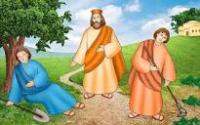
The image of a vineyard was used very often in both the Old and New Testaments. It described the people of Israel (Luke 13:6-9) doing God’s work (Matthew 20:1-16) or was a metaphor for the relationship between Jesus and his followers (John 15:1-7). Today’s parable concerns two sons, who are ordered by their father to work in his vineyard. The second thinks that he can appease his father by charm and politeness. Jesus described the Scribes and Pharisees as ”Whitened sepulchres” (Matt 23:27) These were beautiful on the outside but full of decay within; so the second son thought that by acting the part of the obedient and dutiful son he could hide the fact that he had no intention whatsoever of doing what his father wanted.
The first son refused to go but then relented. Jesus mixed freely with the so-called sinners of his society. Actually, human beings are all sinners in one way or another: even the Pharisees realised this. When they wanted to stone the woman taken in adultery, Jesus said: “Let anyone among you who is without sin cast the first stone” (John 6:1-11). No one volunteered!
The difference between the Pharisees and the “sinners” represented by the first boy was that the latter recognised that they were sinners, and many - like Matthew and Zaccheus - touched by the loving mercy of Jesus, repented.
“Those who know God give him what He wants. Those who don’t know God insist on giving him what he does not want." (Ruth Burrows)